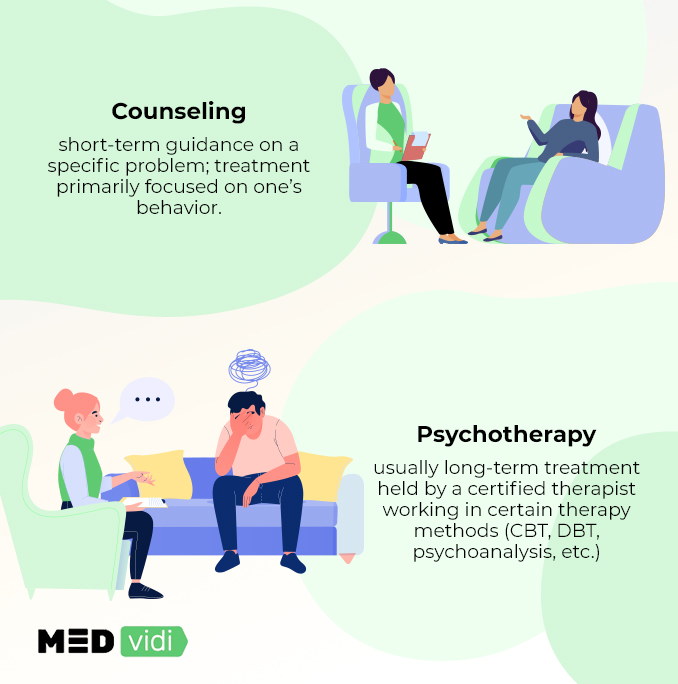In the field of mental health, the terms therapy and counseling are commonly and interchangeably used. However, they are two different concepts even though both can be characterized as psychological methods used to treat mental conditions.
Therapy and counseling have important variations in how they tackle problems, even if there can be significant overlap between them. By being aware of that, you may choose which will best suit your needs and start receiving the support you require. Jump into the article to know more about the difference between therapy vs. counseling.
Psychotherapy Vs. Counseling: Definitions
Counseling
In
Below is a brief description of the types of counseling.
Career counseling | Depending on their areas of interest and skills, counselors provide professional career assistance focused on a specific problem or overall ideas. |
Mental health counseling | After talking with clients about their problems, counselors work to assist them in finding solutions to their problems and enhancing their general well-being. |
Relationship counseling | People seek relationship counseling for several reasons, such as the desire to strengthen their relationship with their partner or to overcome difficulties. |
Psychotherapy
Meeting with a therapist to address unhelpful behaviors, thoughts, or feelings can be referred to as therapy or psychotherapy. It involves the application of psychological and verbal strategies for the treatment of mental illness. Like counseling,
| Individual psychotherapy | One-on-one sessions between a therapist and a patient. |
| Conducted in a group setting that involves people having similar issues. This strategy enables group members to offer and accept support from others. | |
| Couples psychotherapy | It helps couples to improve relationships and resolve any interpersonal issues. |
| Involves multiple family members to improve relationships within the family. |
There are also a variety of techniques used in psychotherapy. Depending on the particular issue a patient is having, a therapist may employ any of the following or other strategies:
What's the Difference Between Counseling and Psychotherapy?
Aspect | Psychotherapy | Counseling |
|---|---|---|
Duration | Psychotherapy is a long-term process to effectively address chronic problems. | Counseling is often used to offer a quick fix to current issues. |
Area of Focus | Psychotherapy deals with deeply ingrained and fundamental psychological problems as well as behavioral problems. | Counseling is more like advice for making educated choices. |
Professionals | Psychotherapy is associated with psychopathologists, psychiatrists, clinical psychologists, and medical settings. | Counseling is more connected with social workers and specialists from educational settings. |
Psychotherapist Vs. Counselor
The practitioners who offer psychotherapy and counseling are referred to as “psychotherapists” and “counselors.” Although the responsibilities of these two professionals are similar, you should be aware of their unique features in their roles before seeking their advice.
Psychotherapist
A person who has received professional training in providing treatment to a patient or client that tackles mental problems is known as a psychotherapist. Mental health therapists have a degree in the field of psychology. By providing guidance to the patient in comprehending the what, why, and how of a problem, therapists frequently try to dive deeper into the mental issues. In addition to dealing with regular stress and sorrow, they also handle mental illnesses such as anxiety and depression.

Counselor
A counselor is a professional trained in the fields of counseling, psychology, social work, or a variety of medical fields such as nursing. Particularly, those working in the mental health field are known as mental health counselors. A trained counselor has typically studied counseling for three or more years in college, at the postgraduate level, or has received training from an authorized higher education institution. They are qualified to provide various services, most typically talk-based forms of therapy.
Do I Need Counseling or Therapy?
Counselors and therapists are both mental health experts focusing on treatment that can assist you in resolving psychological problems and improving your quality of life. People with issues with their emotions or behavior can benefit from psychotherapy. Additionally, it can help those who suffer from a mental illness. Contrarily, you can choose counseling services if you are having challenges with your daily life, such as issues with your career, relationships, or your ability to adjust to different situations.
The Takeaway
Psychotherapy and counseling are approaches that one can use to address personal issues and effectively enhance their quality of life. You can also discuss with your health professionals what suits your needs best, therapy vs counseling.
Our health professionals are here to guide you through the right way. Connect with our team at MEDvidi!












